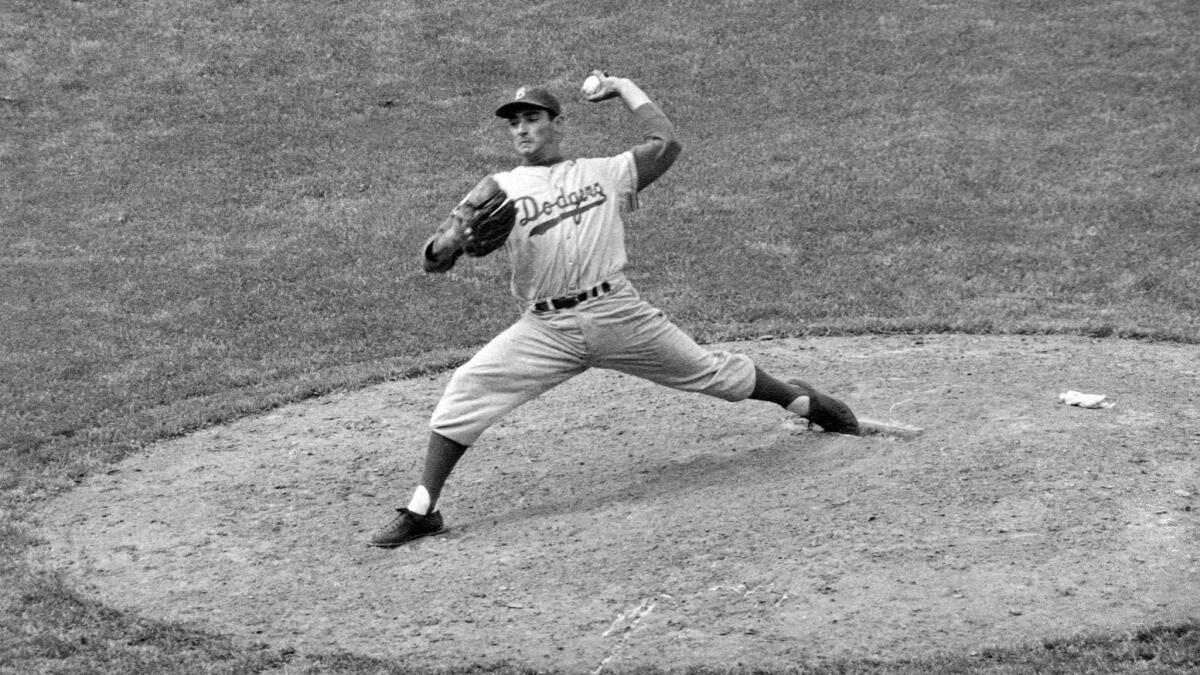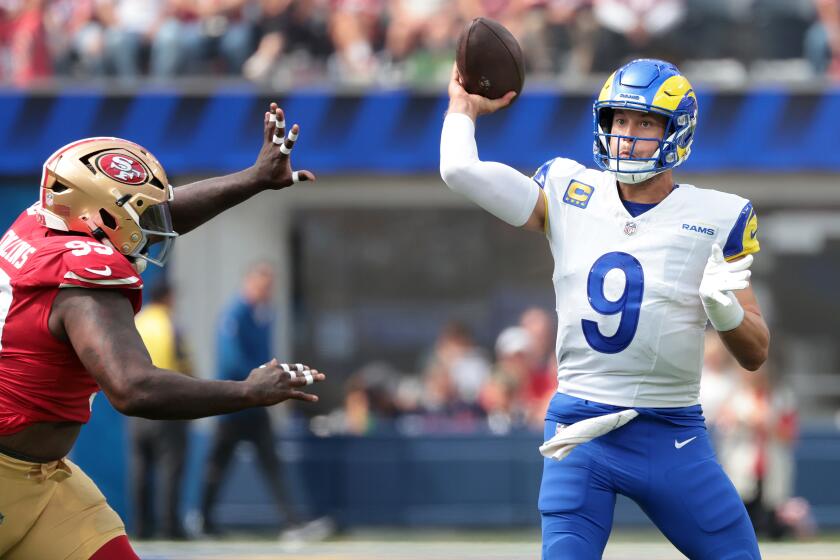Sports Report: Vote in biggest icon in L.A. sports history tournament (baseball regional)

- Share via
Howdy, I’m your host, Houston Mitchell. Let’s get right to the tournament.
As we continue our “Biggest Icon in L.A. Sports History” tournament, we move on to the baseball regional.
Go beyond the scoreboard
Get the latest on L.A.'s teams in the daily Sports Report newsletter.
You may occasionally receive promotional content from the Los Angeles Times.
Some rules.
1. There are four regionals (basketball, baseball, football and wild-card), with 32 people in each regional, seeded from No. 1 to No. 32. The winner of each regional will face off in the Final Four until we get to the championship round, where the last two remaining competitors will be voted upon.
2. With each matchup, there will be a link for you to click on where you can go vote. You will be able to vote either via Twitter, Polldaddy or email.
3. When voting, ask yourself “When I think L.A. sports, who do I think of first?” and vote for that person.
4. A brief sentence or two accompanies each entrant below. It is not meant to be an all-encompassing list of their accomplishments, just a brief reminder of why they are on this list.
Enjoying this newsletter? Consider subscribing to the Los Angeles Times
Your support helps us deliver the news that matters most. Become a subscriber.
So without further ado, let’s get to today’s regional first round, the baseball regional. Click here to take part in the basketball regional.
No. 1 Sandy Koufax vs. No. 32 Jim Gilliam
Sandy Koufax: The greatest pitcher in Dodger history who maintains a certain mystique 54 years after he retired.
Jim Gilliam: He played wherever he was needed and played it well before retiring and becoming a coach. The only non Hall of Famer to have his number retired by the Dodgers.
No. 2 Vin Scully vs. No. 31 John Roseboro
Vin Scully: The voice of the Dodgers for multiple generations.
John Roseboro: All those great pitchers in the 1960s had to have someone to call the pitches. Perhaps one of the most underrated Dodger players of all because he is best remembered for Juan Marichal hitting him with a baseball bat.
No. 3 Tommy Lasorda vs. No. 30 Fred Lynn
Tommy Lasorda: One of the most famous managers in baseball history, he guided the Dodgers to four World Series, winning twice, and remains a fixture at Dodger Stadium.
Fred Lynn: He had a solid but rather uneventful four years with the Angels, so why is he on the list? He was a key member of the USC team that won three consecutive collegiate baseball titles.
No. 4 Don Drysdale vs. No. 29 Vladimir Guerrero
Don Drysdale: “Big D” was part of one of the best 1-2 rotation members in baseball history. Went on to a lengthy broadcasting career including stints with the Angels and the Dodgers.
Vladimir Guerrero: He had a great six-season career with the Angels, averaging over 100 RBIs a season and winning the MVP award in his first season (2004). The first and so far only player inducted into the Hall of Fame as an Angel.
No. 5 Fernando Valenzuela vs. No. 28 Albert Pujols
Fernando Valenzuela: If you didn’t live through “Fernandomania,” it is virtually impossible to describe it accurately. He was a phenomenon. Why his number hasn’t been retired remains a mystery.
Albert Pujols: Signed to a big contract, he has been somewhat of a disappointment with the Angels, but he has averaged over 90 RBIs a season and hit 211 homers with the team, including the 500th and 600th of his career.
No. 6 Clayton Kershaw vs. No. 27 Garret Anderson
Clayton Kershaw: The best pitcher of his generation, Kershaw has been an outstanding pitcher whose postseason reputation was restored a bit with news the Astros cheated.
Garret Anderson: One of the quietest top players in Angels history, he hit 56 doubles (leading the league) in the Angels’ 2002 World Series title season. Still leads the team in several career offense categories. Spent his final season with the Dodgers in 2010.
No. 7 Orel Hershiser vs. No. 26 Tim Salmon
Orel Hershiser: “The Bulldog” had a season for the ages in 1988, when he set the consecutive scoreless innings record, won the Cy Young Award and was MVP of the NLCS and World Series.
Tim Salmon: Another quiet Angels superstar, Salmon spent his entire 14-season career with the Angels and finished with 299 home runs and a rookie-of-the-year award. Hit .286 with 22 homers and 88 RBIs in the 2002 World Series season and hit four homers and 12 RBIs in the postseason.
No. 8 Mike Scioscia vs. No. 25 Don Sutton
Mike Scioscia: You could argue he should be seeded higher that this. Not only was he a valuable member of two World Series title teams with the Dodgers, he managed the Angels to their first, and so far only, World Series title.
Don Sutton: Pencil him into the rotation and watch at least 15 wins roll in each season. Oft-forgotten fact: Also pitched for the 1988 Dodgers.
No. 9 “The Infield” vs. No. 24 Bobby Grich
“The Infield”: Garvey-Lopes-Russell-Cey. They played together longer than any infield in history. Went to four World Series together. It seemed only right to put them in the tournament as a unit.
Bobby Grich: The emotional leader of all those good 1980s Angels teams. Played 10 seasons for the team and tied for the AL home run lead in 1981. You could make a case that he belongs in the Hall of Fame.
No. 10 Mike Trout vs. No. 23 Willie Davis
Mike Trout: The greatest current player who, at this rate, could end up being the greatest player of all time.
Willie Davis: “3-Dog” was the Dodgers’ starting center fielder for 13 seasons, replacing Duke Snider. Key member of two World Series title teams (1963, 1965). Gold Glove defender who led the league in triples twice.
No. 11 Maury Wills vs. No. 22 Jaime Jarrin
Maury Wills: The man who helped reintroduce the stolen base to the majors, you could hear the entire stadium chanting “Go! Go! Go, Maury Go!” whenever he reached base.
Jaime Jarrin: The Spanish language voice of the Dodgers since 1959, he was inducted into the Baseball Hall of Fame in 1998.
No. 12 Walter Alston vs. No. 21 Mike Piazza
Walter Alston: Lasorda gets the accolades, but you could argue that Alston is the best manager in Dodgers history. Guided the team to the Dodgers’ first World Series title in Brooklyn, then won three more after the team moved to L.A. The polar opposite of Lasorda, personality-wise.
Mike Piazza: Dodgers fans are left to wonder what might have happened had Fox not traded Piazza to the Florida Marlins so early in his career. The best-hitting catcher ever.
No. 13 Kirk Gibson vs. No. 20 Jim Fregosi
Kirk Gibson: He played only three seasons in L.A., but it felt like he single-handedly took the team to the 1988 World Series title and gave us what many say is the greatest moment in L.A. sports history.
Jim Fregosi: The Angels’ first true superstar, he made seven All-Star teams with them and is one of the best players in team history. Then he returned in 1979 as a manager and led them to their first postseason berth.
No. 14 Don Newcombe vs. No. 19 Rod Carew
Don Newcombe: He pitched only one season in L.A., but was a fixture at Dodger Stadium and counseled many Dodgers, and baseball players around the majors, on alcoholism. Deserves a spot here for that alone.
Rod Carew: Hit .314 in a seven-season Angels career and got his 3,000th hit with the team. Spent a few seasons as an Angels batting coach after he retired and is one of the greatest hitters ever.
No. 15 Gene Autry vs. No. 18 Nolan Ryan
Gene Autry: Founded the Angels’ franchise and did everything he could to get the team to the World Series. When they finally won one after his passing, several Angels wore one of his cowboy hats on the field in tribute to him and all he did for the team.
Nolan Ryan: Perhaps the best pitcher in team history. Should have won the Cy Young in 1973, when he pitched two no-hitters, struck out a record 383, completed 26 of 39 starts and had a save. I expect my former colleague, Chris Dufresne, to vote multiple times for him.
No. 16 Rod Dedeaux vs. No. 17 Walter O’Malley
Rod Dedeaux: Dedeaux was the baseball coach at USC for 45 seasons. His teams won 11 national titles, including a record five straight (1970–1974), and 28 conference championships. He was named coach of the year six times and was named “Coach of the Century” by Collegiate Baseball magazine. He was also one of the 10 initial inductees to the College Baseball Hall of Fame.
Walter O’Malley: Brought the team from Brooklyn to Los Angeles in 1958 and was a baseball power broker behind the scenes.
BORN ON THIS DAY
1859: Football coach Walter Camp (d. 1925)
1873: Baseball manager John McGraw (d. 1934)
1944: Former Angels general manager Bill Stoneman.
1954: Football player Tony Dorsett
1960: Boxer Buster Douglas
1969: Football player Ricky Watters
1975: Football player Ronde Barber
1975: Football player Tiki Barber
1979: Former Dodger Adrián Beltré
DIED ON THIS DAY
1968: Race car driver Jim Clark, 32
AND FINALLY
Buster Douglas shocks the world by knocking out Mike Tyson. Watch it here.
Until next time...
That concludes today’s newsletter. If you have any feedback, ideas for improvement or things you’d like to see, email me at houston.mitchell@latimes.com, and follow me on Twitter at @latimeshouston. To get this newsletter in your inbox, click here.
Go beyond the scoreboard
Get the latest on L.A.'s teams in the daily Sports Report newsletter.
You may occasionally receive promotional content from the Los Angeles Times.




